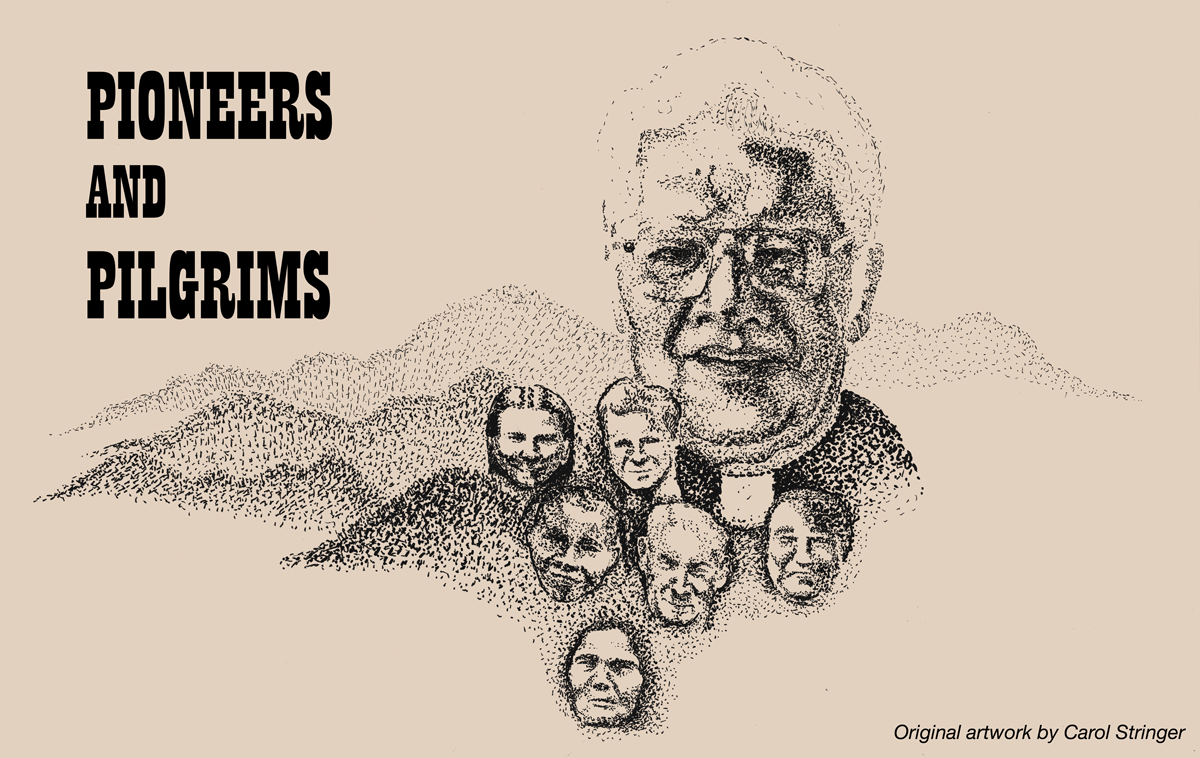I was surprised to find myself on a tin roof one morning this past March.
Although I had signed up for Workfest knowing I would be assisting with construction, I hadn’t anticipated anything this daunting. Not only was I on a roof, I was on an unfinished roof made up only of rafter beams over a trailer, or in some places, rafters over nothing at all.
The plan was to craft what the construction crew leaders affectionately called a “sweatshirt” around the trailer, effectively making it safe, warm, and dry. That meant constructing an entirely new roof over the older, pre-existing one. Climbing on a roof like that was uncomfortable. I didn’t really want to work on a roof that I could have easily fallen from with a gentle push, or the slip of a shoe. I had to sit on boards and scoot along, carefully placing my feet each time so that I didn’t slip. I couldn’t stand up. The wind was insanely cold, and I was constantly nervous I was about to fall off or blow away. But in the end, I kept kept my emotions to myself, remained calm, sat there, did my job, and safely climbed back down when we were done, because even though I didn’t want do it, no one else really did either.
Service can be uncomfortable, but it’s what we’re called to do. Deep down, I knew that roof was the most important thing we needed to accomplish that week for our homeowners. Their need overcame my reluctance, and ultimately I was proud of what we accomplished.
Serving others is rarely the glamourous, “feel‑good” experience many people perceive it to be. We’re accomplishing the work that often no one else wants to do, in a location that no one wants to visit, helping people who are often invisible to those around them.
Few people understood the complex nature of service better than Christian Appalachian Project’s (CAP) founder, Rev. Ralph Beiting, who dedicated his life to serving the people of Appalachia.
ORIGINS
Whatever his expectations might have been, upon arrival in Appalachia, Rev. Beiting discovered that the home and future chapel he had been provided with was dilapidated. An overgrown yard, collapsed front porch, sagging floor, and a complete lack of furniture greeted him in his drafty new home. Thinking he could have his new parishioners assist him with cleaning the place up, he soon learned that there were only a handful of practicing Catholics in the area. There wasn’t even a church in Berea, Ky.; the closest Catholic Church at that time was in Richmond, Ky.
Faced with these challenges, he began to feel overwhelmed and uncertain about what he had gotten himself into. However, it soon became apparent to him that the needs of his new flock were greater than his own. In a region devastated by the decline of the mining and timber industries, he found that many people were downtrodden and in need of assistance, both physical and spiritual. The lack of opportunities for the people of this region had far-reaching implications for education, infrastructure, and the emotional and physical well-being of the populace. Without industry, there were no jobs and no hope. At the time he arrived, adult illiteracy was not an uncommon problem, only adding to the long list of educational shortcomings that plagued the region’s adults.
Rev. Beiting was initially overwhelmed by the region’s poverty and the physical needs of his new parishioners. Yet he was determined to do something about it. He began to investigate outlets to address their needs and reached out to the students of Catholic colleges in the state. He made frequent trips to his home in Northern Kentucky, where he would gather up donations of food and clothing that he would distribute back in Appalachia.
Deep down, he knew that these small loads of goods were not enough to make a dent in the needs of the region, but something needed to be done to address the root causes of poverty instead. By the early 1960s, Rev. Beiting had initiated a number of fledgling programs, including Bible schools, a used clothing store, and an emergency family shelter. The reach of these programs was ever-expanding, and times were changing.
1964 was not just the year that Christian Appalachian Project formed out of the original programs, but also the year of the War on Poverty and the Second Vatican Council. Feeling the need to organize and direct the new programs he had started, he took great pains to come up with a name that he felt accurately represented his new organization. It was “Christian” because he wanted volunteers and participants to remember their commitment to spirituality, and because without their dedication to Christ, he felt they would not succeed; and it was a “project” because it was a service-based organization where volunteers would get their hands dirty.
While he was committed to the spiritual nature of this new organization, he wanted to make sure that it was clearly inclusive, rather than exclusive. It was obvious to him that there was more than enough work to go around for anyone of the faith who wanted to help in Appalachia, not just Catholics. Previously, Rev. Beiting had been met with much resistance from the regional bishop when he attempted collaboration with local churches. He continued to persevere, and eventually their own views on the topic began to relax.
Rev. Beiting would have been aware of the changes at that time coming from the Second Vatican Council. Great strides were being made towards a thaw in the Church’s relationship with Protestants and other religions. His embracive attitude toward the new doctrine is evident in his long-time commitment to service and dedication to the people of Appalachia regardless of their faith. Just as it was then, the volunteers and staff of CAP continue to be a diverse group from all walks of life. Our differences unite and strengthen us as we come together to serve our region—a quality Rev. Beiting understood and valued.
WAR ON POVERTY
On a national level, changing social attitudes and ideas contributed to the creation of the Great Society and War on Poverty legislation enacted by President Lyndon B. Johnson.
After seeing the poverty of Appalachia firsthand on the campaign trail, he vowed to do everything possible to pull the area out of its economic slump. At the time Christian Appalachian Project was founded, President Johnson drafted his important legislation that created the Food Stamp program, Economic Opportunity Act, and Social Security, among other things, collectively known as the War on Poverty. This body of legislation was created with the people of Appalachia in mind after President Johnson visited the area while campaigning.
President Johnson’s declaration of the War on Poverty lit a fire in the region that initiated numerous work-related programs intended to help the Appalachian people. Government money flooded into the region to improve the lives of the poverty-stricken; however, Rev. Beiting saw that, over time, many of those programs “quickly deteriorated into a vast effort to keep the money flowing.” Regardless of their intentions, they often failed to provide sustainable skills that translated to jobs or services for many people.
At the time, Rev. Beiting deeply considered accepting government funding for CAP but ultimately turned it down. As time passed, the government lost interest and the money evaporated, leaving the region without many tangible results from the effort. Rev. Beiting’s insight into the outcome of the funding only proved his guidance of CAP was founded in a divine vision for our future path. As other organizations failed and left the region, we remained and grew stronger, expanding our ability to help people help themselves in Appalachia.
Today, CAP has expanded to be the 18th-largest human service organization in the nation. We remain an established coalition of programs that address the needs of our region. By remaining fluid with our services and abilities, we are able to fill the cracks in the services provided by others that help stabilize Appalachian families and individuals. Our organization strives to be flexible in meeting the needs of our participants. We have created a system known as “wrap-around care” where we address multiple needs to the best of our abilities. Often, as we get to know the families of our participants, we discover they might have other needs or that another family member needs help. In this way, we provide more comprehensive assistance than if we only provided rigid, one-dimensional aid. Unlike others, we tailor our service to meet the needs of the people we help.
As demand for a service grows or decreases, we open or close programs; this way we always use our resources to the best of our ability. While the Great Society and the War on Poverty came to an end, some elements remain. When I was sworn in as an AmeriCorps VISTA volunteer, I had a crash course on Lyndon B. Johnson’s war on poverty. AmeriCorps VISTA (Volunteers in Service to America) is a vestigial program of the Great Society measures put in place by Johnson. I was surprised at how closely the history of the organization I would be working with, CAP, mirrored the time frame of the War on Poverty and VISTA. Here I was, fifty years out, continuing the work set in motion by those early pioneers of altruism in our region. After all, some of the first VISTA volunteers did come to the hills of Appalachia.








